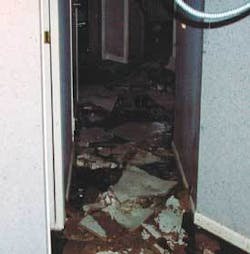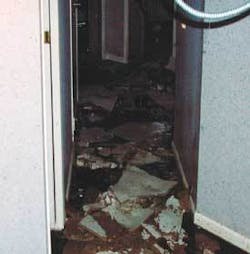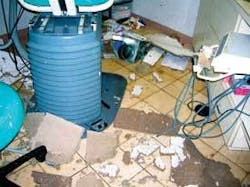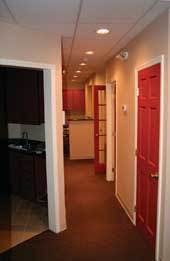My office was damaged. Here’s what to do when catastrophe strikes.
by Ira Handschuh, DDS
Picture this: The telephone ringsat two in the morning. The alarm company tells you they have dispatched the police to your office. As in the past, you expect the call is simply a false alarm, and the lack of further telephone calls confirm that - at least until the start of your workday. Upon opening the door to your office, you see your worst nightmare. The office has been totally destroyed by water. A pipe had burst in your upstairs neighbor’s suite during the night.
On Aug. 2, 2006, I walked into that very same nightmare. The ceiling tiles, concrete, and all light fixtures had fallen. Electrical wires were dangling; furniture, equipment, and computers were all soaked. The office had 5 inches of water throughout and it was flowing out the door, into the main corridor and down the staircase.
Any business is at risk for dealing with such a disaster. It isn’t always caused by water; often fire or theft causes the interruption to your business. During the past six months I have learned a great deal that will prepare me if I am ever again surprised by a catastrophe that can cripple or destroy my business. I am writing this article to shed some light onto some of the systems that everyone should have in place in the event an emergency were to turn your professional life upside down.
Organization is paramount
Make certain all your insurance information is safe and readily available. Keep copies at an off-site location. All critical paperwork, insurance policies and broker phone numbers should be stored in a file cabinet as high off the floor as possible. All of the papers I had stored on floor-level cabinets were destroyed.
Secondly, know where your files are located. Upon opening the door to my suite and viewing the destruction, I immediately entered my private office file cabinet, retrieved the insurance policy information, and called my broker to inform him that I needed to file a claim. A claim manager was assigned to my case and I was given a case number within an hour of my telephone call. An adjustor was assigned as well.
I then called my landlord, the water department (to have the water shut off to stop the continuing flood), and my attorney. I recommend keeping all these important telephone numbers stored in your cell phone or PDA for easy access. I shut off the main electrical breakers to avoid any potential danger to people in my suite.
The next step was to retrieve the two main computers from the office, which brings the third important point to light. Make certain your data is backed up nightly and someone from the office (if not yourself) takes the tape home. My computer guru has rammed into my head the importance of this in case of such a catastrophe. (The World Trade Center is the best example to think about and you will never again miss a night without backing up!)
Next, my entire staff came in with hundreds of boxes to get all patient records out of the office. It was a blessing that the records were not wet; in fact they were really the only things in the office that were dry. I attribute this to the file cabinets being closed and up high off the floor.
Very few of us truly know what we have in our insurance policies. Since the flood, I think I have read the policy 20 or 30 times with knowledgeable people (such as attorneys and adjustors), and I have learned that these policies are written with many gray areas that are subject to different interpretations by different parties. Because of these differences of opinion, you must ensure that you have certain things in your policy.
Business interruption coverage is critical
This will ensure that you will be compensated while you are out of business during the rebuilding process, and the amount is less than 100 percent. The true amount you will be compensated is computed from a complicated formula used by the insurance company’s adjustor and their accountants. You will likely be compensated much less than you think, but, without Business Interruption, a practice could go into bankruptcy. The insurance company will ask for past years’ taxes and production records, so if you have easy access to them it will make your life easier. Since most practices today utilize dental practice management software, a few keystrokes should produce all of your data.
My policy covers my business interruption for 12 months. I also have a two-month clause that will continue my business interruption benefits even after I’m back in my space if my production is considerably less than before.
Make certain you have replacement value
This coverage gives you a greater advantage for compensation for your contents damage. The insurance company sent an “expert” to evaluate my equipment damage. The company of experts it hires is made up of electrical engineers, not specialists to dental or medical equipment. He was sent back to my office twice, at my request, because his first visit lasted maybe 10 minutes - and he didn’t even have my list of damaged items! He simply took photographs. The report of his initial evaluation was lengthy and somewhat generic (per my attorney and public adjustor I hired on my behalf. More on that later). Items were missing from the report, and things that were completely broken were listed as “salvageable.” I considered this report to be a starting point for a lengthy and frustrating negotiation with the insurance company for appropriate compensation, with the goal of getting back in business as quickly as possible with limited financial pain.
Policy limits and video documentation
Make certain your policy limits are high enough to fully cover the contents of the office. I learned a valuable lesson with this experience, so upon renewing my policy I will insist that my broker comes to my office to review in detail everything I have. This will assist me in deciding the coverage limits I need to replace my office contents in the event my entire office is destroyed. In all the years with my insurance broker (a large, NYC-based insurance company), I have never met anyone face to face, and none of their agents have ever reviewed my policy with me to ensure proper coverage upon renewal. In the future, I will insist on a face-to-face meeting. If the broker won’t do this, it’s time to find a new broker.
Another very important thing to do is to videotape and photograph your contents. This allows for proper reimbursement by proving that the items existed.
Don’t go it alone!
In the event of a disaster in your office, realize this - you are alone! After working for two days for about 22 hours a day and upon the recommendation of my attorney, I found salvation in hiring a public adjustor. A public adjustor is the equivalent of a buyer’s agent in a home purchase transaction. They are men and women who work for the person making the claim. They do battle with the insurance company adjustor to get your claim settled as quickly as possible and with the best reimbursement possible. Public adjustors work on a contingency percentage, which is negotiable and seems to range from 5 to 12 percent. I did not choose to negotiate this number further than our initial discussion, and found my adjustor to be quite fair and worth every penny!
While you rebuild your space, try to find another office for seeing patients. I was renting space from a colleague within three days of the flood. It isn’t a bad idea to set up a group of dentists who can cover for one another in case of an emergency. This can give you great peace of mind and reduce anxiety in knowing that if you become displaced from your office, you’ll be able to maintain your practice during the rebuilding period.
No one can predict when an emergency will strike your business. The best thing to do is be prepared by understanding your policy coverage and knowing - and protecting - the location of important documents in your office. If the worst happens, remember, be patient. It takes time to sift through the insurance company bureaucracy and red tape. As long as no one is injured and if you keep your head and surround yourself with people who know the insurance “game,” you will get through it without losing your hair. You may be just a bit grayer - and wiser - when it’s all over.
Dr. Ira Handschuh practices in White Plains, N.Y., where he maintains a cosmetic, implant, and general dental practice. He graduated from NYU College of Dentistry in 1990. Dr. Handschuh may be reached by calling (914) 683-5898, or by e-mail at [email protected].
Picture this: The telephone ringsat two in the morning. The alarm company tells you they have dispatched the police to your office. As in the past, you expect the call is simply a false alarm, and the lack of further telephone calls confirm that - at least until the start of your workday. Upon opening the door to your office, you see your worst nightmare. The office has been totally destroyed by water. A pipe had burst in your upstairs neighbor’s suite during the night.
On Aug. 2, 2006, I walked into that very same nightmare. The ceiling tiles, concrete, and all light fixtures had fallen. Electrical wires were dangling; furniture, equipment, and computers were all soaked. The office had 5 inches of water throughout and it was flowing out the door, into the main corridor and down the staircase.
Any business is at risk for dealing with such a disaster. It isn’t always caused by water; often fire or theft causes the interruption to your business. During the past six months I have learned a great deal that will prepare me if I am ever again surprised by a catastrophe that can cripple or destroy my business. I am writing this article to shed some light onto some of the systems that everyone should have in place in the event an emergency were to turn your professional life upside down.
Organization is paramount
Make certain all your insurance information is safe and readily available. Keep copies at an off-site location. All critical paperwork, insurance policies and broker phone numbers should be stored in a file cabinet as high off the floor as possible. All of the papers I had stored on floor-level cabinets were destroyed.
Secondly, know where your files are located. Upon opening the door to my suite and viewing the destruction, I immediately entered my private office file cabinet, retrieved the insurance policy information, and called my broker to inform him that I needed to file a claim. A claim manager was assigned to my case and I was given a case number within an hour of my telephone call. An adjustor was assigned as well.
I then called my landlord, the water department (to have the water shut off to stop the continuing flood), and my attorney. I recommend keeping all these important telephone numbers stored in your cell phone or PDA for easy access. I shut off the main electrical breakers to avoid any potential danger to people in my suite.
The next step was to retrieve the two main computers from the office, which brings the third important point to light. Make certain your data is backed up nightly and someone from the office (if not yourself) takes the tape home. My computer guru has rammed into my head the importance of this in case of such a catastrophe. (The World Trade Center is the best example to think about and you will never again miss a night without backing up!)
Next, my entire staff came in with hundreds of boxes to get all patient records out of the office. It was a blessing that the records were not wet; in fact they were really the only things in the office that were dry. I attribute this to the file cabinets being closed and up high off the floor.
Very few of us truly know what we have in our insurance policies. Since the flood, I think I have read the policy 20 or 30 times with knowledgeable people (such as attorneys and adjustors), and I have learned that these policies are written with many gray areas that are subject to different interpretations by different parties. Because of these differences of opinion, you must ensure that you have certain things in your policy.
Business interruption coverage is critical
This will ensure that you will be compensated while you are out of business during the rebuilding process, and the amount is less than 100 percent. The true amount you will be compensated is computed from a complicated formula used by the insurance company’s adjustor and their accountants. You will likely be compensated much less than you think, but, without Business Interruption, a practice could go into bankruptcy. The insurance company will ask for past years’ taxes and production records, so if you have easy access to them it will make your life easier. Since most practices today utilize dental practice management software, a few keystrokes should produce all of your data.
My policy covers my business interruption for 12 months. I also have a two-month clause that will continue my business interruption benefits even after I’m back in my space if my production is considerably less than before.
Make certain you have replacement value
This coverage gives you a greater advantage for compensation for your contents damage. The insurance company sent an “expert” to evaluate my equipment damage. The company of experts it hires is made up of electrical engineers, not specialists to dental or medical equipment. He was sent back to my office twice, at my request, because his first visit lasted maybe 10 minutes - and he didn’t even have my list of damaged items! He simply took photographs. The report of his initial evaluation was lengthy and somewhat generic (per my attorney and public adjustor I hired on my behalf. More on that later). Items were missing from the report, and things that were completely broken were listed as “salvageable.” I considered this report to be a starting point for a lengthy and frustrating negotiation with the insurance company for appropriate compensation, with the goal of getting back in business as quickly as possible with limited financial pain.
Policy limits and video documentation
Make certain your policy limits are high enough to fully cover the contents of the office. I learned a valuable lesson with this experience, so upon renewing my policy I will insist that my broker comes to my office to review in detail everything I have. This will assist me in deciding the coverage limits I need to replace my office contents in the event my entire office is destroyed. In all the years with my insurance broker (a large, NYC-based insurance company), I have never met anyone face to face, and none of their agents have ever reviewed my policy with me to ensure proper coverage upon renewal. In the future, I will insist on a face-to-face meeting. If the broker won’t do this, it’s time to find a new broker.
Another very important thing to do is to videotape and photograph your contents. This allows for proper reimbursement by proving that the items existed.
Don’t go it alone!
In the event of a disaster in your office, realize this - you are alone! After working for two days for about 22 hours a day and upon the recommendation of my attorney, I found salvation in hiring a public adjustor. A public adjustor is the equivalent of a buyer’s agent in a home purchase transaction. They are men and women who work for the person making the claim. They do battle with the insurance company adjustor to get your claim settled as quickly as possible and with the best reimbursement possible. Public adjustors work on a contingency percentage, which is negotiable and seems to range from 5 to 12 percent. I did not choose to negotiate this number further than our initial discussion, and found my adjustor to be quite fair and worth every penny!
While you rebuild your space, try to find another office for seeing patients. I was renting space from a colleague within three days of the flood. It isn’t a bad idea to set up a group of dentists who can cover for one another in case of an emergency. This can give you great peace of mind and reduce anxiety in knowing that if you become displaced from your office, you’ll be able to maintain your practice during the rebuilding period.
No one can predict when an emergency will strike your business. The best thing to do is be prepared by understanding your policy coverage and knowing - and protecting - the location of important documents in your office. If the worst happens, remember, be patient. It takes time to sift through the insurance company bureaucracy and red tape. As long as no one is injured and if you keep your head and surround yourself with people who know the insurance “game,” you will get through it without losing your hair. You may be just a bit grayer - and wiser - when it’s all over.
Dr. Ira Handschuh practices in White Plains, N.Y., where he maintains a cosmetic, implant, and general dental practice. He graduated from NYU College of Dentistry in 1990. Dr. Handschuh may be reached by calling (914) 683-5898, or by e-mail at [email protected].



